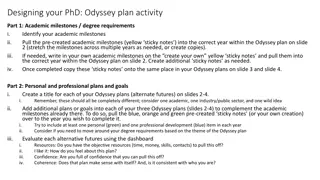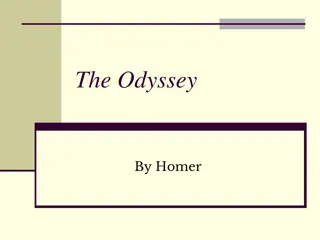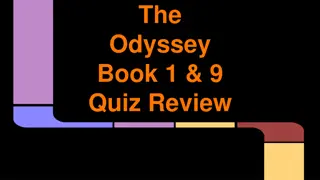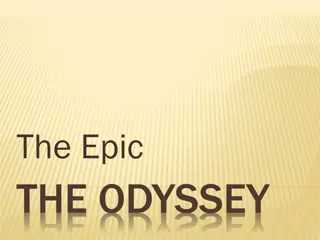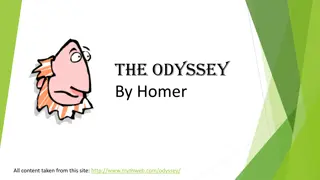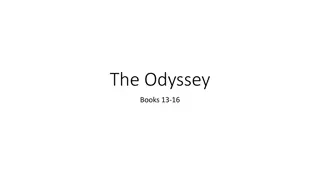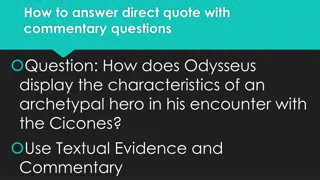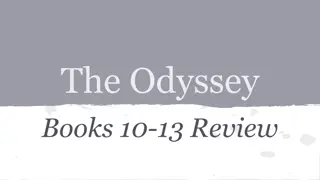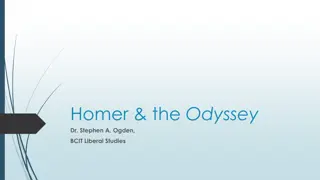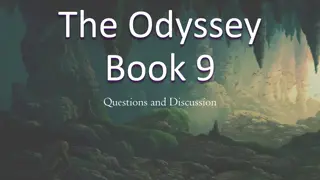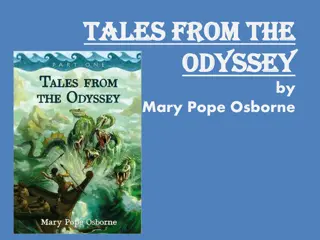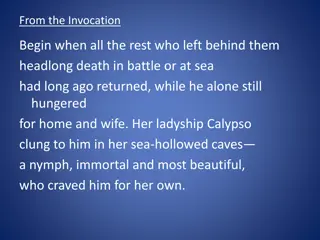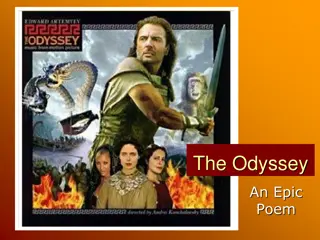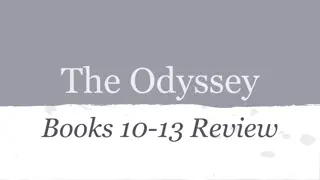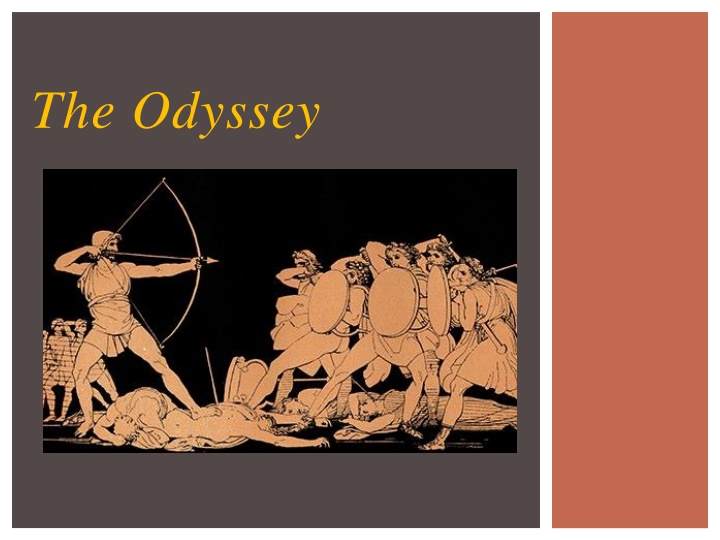
Unraveling the Enigmatic World of Homer and the Trojan War
Delve into the fascinating world of Greek poet Homer and the mythical Trojan War as you explore the mysteries surrounding his identity, the classic features of his poetry, the legendary city of Troy, and the cunning adventures of Odysseus. Uncover the blend of history and myth that continues to captivate readers and historians alike.
Download Presentation

Please find below an Image/Link to download the presentation.
The content on the website is provided AS IS for your information and personal use only. It may not be sold, licensed, or shared on other websites without obtaining consent from the author. If you encounter any issues during the download, it is possible that the publisher has removed the file from their server.
You are allowed to download the files provided on this website for personal or commercial use, subject to the condition that they are used lawfully. All files are the property of their respective owners.
The content on the website is provided AS IS for your information and personal use only. It may not be sold, licensed, or shared on other websites without obtaining consent from the author.
E N D
Presentation Transcript
Homer Many believe that Homer was a _______ Greek poet who wandered from town to town chanting his poetry to the accompaniment of a ____. Some say that the lyrics were not written by one person but are instead a ________ of Greek poems.
Homer the Poet Authorities do not agree exactly when Homer lived. Dates vary anywhere from the______ to the_____ B.C. Where he was born is __________. The poetry was written down around the latter part of the _____ century B.C. (Before that it had been recited by _______ .) Historians don t know if Homer was real or fictional. Some say he was a solo author; others say his stories were actually written by many people over many centuries.
Features that Make Homers Poetry Classic are: Simplicity of ________ Swift movement of _________ Creation of characters with simple ________ Actions that are true to human nature Plots that blend the joys of living with ______ elements of life Long ______ lines (in the original Greek version)
The Trojan War The Trojan War (around 1200 BC) was fought after _____, the wife of King _________ of Sparta, was kidnapped by Prince ______, the son of King Priam of ______. After battling for ____ years, the Greek, Odysseus, conceived a clever plan to make a gift of a large wooden ______ to transport hidden soldiers into the heart of Troy. The plan worked, and once the horse was inside the city walls, the soldiers emerged at night and opened the gates to admit the rest of the Greek army. The Greeks killed
The Trojan War The Trojan War was considered a myth until Troy was excavated in the late 19thcentury.
The Actual City of Troy Troy has been destroyed and rebuilt several times. The earliest discovery found a primitive city with stone walls, well- built houses, and hoards of precious metals. In our century, explorers have found evidence of at least nine cities, some destroyed by earthquakes, other by plundering and fire. Historians believe the Troy Homer wrote about was one they have dated to about ______ B.C.
Odysseus Odysseus was a king of _____ in Greek mythology. He and his wife _______ had a son named _________. When Paris kidnapped Helen of Troy, Menelaus needed Odysseus's help. Odysseus did not want to leave his family and kingdom and fight, so he pretended to be insane, but Palamedes put Telemachus in the path of a plow Odysseus was using in a field. Odysseus swerved to avoid the boy which revealed his sanity. After the fall of Troy, Odysseus wandered for ten years before he was able to return to Ithaca and his wife. The adventures form the plot of The Odyssey
The Odyssey: An Epic Poem Epic: A long _______ (in verse form) about the adventures of a hero ___________________ ___________________ ____________ They Odyssey is an epic poem. Examples of epics include the following: Tolkien s Lord of the Rings trilogy or the Star Wars movies created by George Lucas.
Epics typically have the following specific elements: A suffering city or nations and its people A love interest for the hero Member(s) of a royal family At least one deity, who ___________ At least one deity, who works against the hero Dangerous ___________ creatures Great deeds such as battles (against monsters, armies, antagonists, and supernatural elements), finding magical objects, destroying magical objects, saving other characters in danger Oaths, curses, and _________ Many real or imaginary locations with dangers on the way to a new place
Characteristics of an Epic Long narrative poem Can t be told at one sitting Tales are ________ (revolves around several characters) Spans many years Tells the adventure of a hero Starts in the _______ In medias res: beginning a story at its midpoint; flashback is used to reveal previous actions.
Characteristics of an Epic Hero Humanity Strength Bravery Steadfastnes s Spirit of ________ Generosity Loyalty Listen to__________ _ Manners Pride
Social Values of the Epic Hero Family Respect for the ______ Represents his community Values women and elders Creates a ______ Honors the ______
Elements of the Epic Hero Cycle: Is often possessed of ________ abilities or qualities. Is tested, often to prove the ________ of himself and his quest. Encounters numerous ______ beings, magical and helpful animals, and human helpers and companions. Is charged with a quest.
More Elements of the Epic Hero Cycle Travels to a supernatural world, often one that _______ human beings are barred from entering. Must reach a _____ point where he nearly gives up his quest or appears defeated. Experiences a ____________ Finds _________. Often this takes the form of the hero regaining his rightful place on the throne.
Greek Hero Birth/Origin: Sons of gods or _______ Quest: Heroes are called upon to make a journey -- to battle some beast that plagues the community or to retrieve something of value that was lost. Goal: Always for the good of the community Journey: The quest is not always clear. The hero frequently becomes lost or confused. Danger: Despite the trials, battles, or temptations, the hero feels isolation and alienation from his community. There is a real danger of him giving up.
Greek Hero - continued Friends: They provide the hero with support, but they do not _________ the hero fully and therefore are not the help he needs. The hero must accomplish the task alone. Guides: They can help the hero, but often their powers are limited. Darkness: Because the hero is alone, he often retreats into despair and darkness Success: Ultimately a hero is always successful in his quest because he prevails over despair and he emerges from the darkness
LITERARY TERMS EPIC HERO POINT OF VIEW: THIRD PERSON OMNISCIENT A common form of third-person narration in which the teller of the tale, who often appears to speak with the voice of the author himself, assumes an _______________(all-knowing) perspective on the story being told.
LITERARY TERMS INVOCATION An invocation is an address to a deity, usually for help of some sort. The epic traditionally begins with an invocation to the Muse (a request for help in the telling of the tale). In fact, in an oral culture, the storyteller is considered merely a vessel through which the gods (particularly the Muses) speak. There are traditionally nine Muses, each presiding over a different genre of literature. The traditional Muse of epic poetry is Calliope, although Homer does not address her by name in his invocation at the beginning of the Odyssey.
LITERARY TERMS NARRATIVE DRIFT Homer is constantly interrupting the narration to elaborate on an aspect of what he is talking about. If he mentions a gift of wine, he will explain not only the history of the gift but the history of the giver. He rarely introduces a character without alluding to that character's genealogy and often follows this with an aside in the form of a story that is told with the same vividness as the main story.
LITERARY TERMS EPIC SIMILE Homer loves similes (a comparison between two seemingly unlike things using "like" or "as"). They can be found everywhere in The Odyssey. Homer often expands upon a simile, putting it into motion so to speak. These expanded similes are called Homeric or epic similes. As a man will bury his glowing brand in black ashes, off on a lonely farmstead, no neighbors near, to keep a spark alive, so great Odysseus buried himself in leaves and Athena showered sleep upon his eyes. I drove my weight on it from above and bored it home like a shipwright bores his beam with a shipwright's drill that men below, whipping the strap back and forth, whirl and the drill keeps twisting, never stopping
LITERARY TERMS EPIC CATALOGUE A list (usually long) of people, things, or attributes. It is a device used particularly by ancient and oral literatures, although it can also be find in modern poets such as Walt Whitman or Carl Sandburg. Examples in Homer's Odyssey include the many catalogues of dead heroes and women in Book XI.
LITERARY TERMS HUBRIS Overreaching pride, resulting from the overconfidence of a protagonist. In Homer, it is usually directed against the gods, for example the belief that one accomplished some act without their help or the belief that humans do not need the gods in their everyday lives. PRIDE
LITERARY TERMS EPITHETS Homer repeatedly describes many of his characters or objects in his story with the same phrase. This phrase is called an epithet. Epithets are: Common epic elements which allow the reader to easily identify the character or object. Stress a quality of what they are describing. (The same character often is given several different epithets.) Were chosen to fit the meter of the line. Many translators, however, like to fit the epithet to an aspect of the character that is relevant to the moment.
LITERARY TERMS EPITHETS (CONTINUED) Examples: "The great tactician" - This term creates the image of Odysseus as being intelligent, and probably comes his being the initiator of the idea for the "Trojan horse." "The clear eyed goddess" - This helps the reader imagine that Athena is alert, and wise - farseeing. "The man of twists and turns" ( Odysseus) "The bewitching nymph" (Calypso) "Cool headed" (Telemachus)
SEVEN DEADLY SINS 1. Wrath- 2. Greed 3. Sloth
SEVEN DEADLY SINS 4. Pride- 5. Lust 6. Envy- 7. Gluttony




